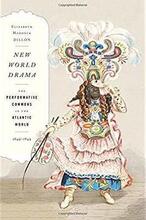This essay locates the origin of biopolitics on the Caribbean plantation and elaborates a theory of “zombie biopolitics”—a phrase used to describe the living death of slavery and to revise, as well, Foucault’s dichotomy between sovereign power (which lets live and makes die) and biopower (which makes live and lets die). Zombie biopower, in contrast, makes live as dead. With attention to geography, capitalism, and race as aspects of biopower that need foregrounding in the Plantationocene, the paper moves from the scene of the living dead on the plantation of Barbados in the seventeenth century, to an account of the zombie’s origins in colonial St. Domingue, and turns in closing to the relation between the Caribbean origins of the zombie and Hollywood zombie culture.
Publications
2019
2017
2016
2015
2014
In New World Drama, Elizabeth Maddock Dillon turns to the riotous scene of theatre in the eighteenth-century Atlantic world to explore the creation of new publics. Moving from England to the Caribbean to the early United States, she traces the theatrical emergence of a collective body in the colonized New World—one that included indigenous peoples, diasporic Africans, and diasporic Europeans. In the raucous space of the theatre, the contradictions of colonialism loomed large. Foremost among these was the central paradox of modernity: the coexistence of a massive slave economy and a nascent politics of freedom. Audiences in London eagerly watched the royal slave, Oroonoko, tortured on stage, while audiences in Charleston and Kingston were forbidden from watching the same scene. Audiences in Kingston and New York City exuberantly participated in the slaying of Richard III on stage, enacting the rise of the "people," and Native American leaders were enjoined to watch actors in blackface "jump Jim Crow." Dillon argues that the theater served as a "performative commons," staging debates over representation in a political world based on popular sovereignty. Her book is a capacious account of performance, aesthetics, and modernity in the eighteenth-century Atlantic world.
